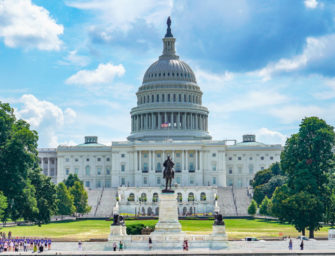Key Takeaways From the December 2019 AGU Council Meeting
By Scott King, Study of the Earth’s Deep Interior section president and member of AGU’s 2019-2020 Council
As the AGU community prepares to conclude its Centennial celebrations and launch the next 100 years of scientific discovery and innovation, I joined my fellow AGU Council members in San Francisco ahead of Fall Meeting 2019. The Council met to address difficult questions facing the AGU community and moved the needle on five key issues.
1) Increasing scientific engagement:
Establishing and communicating AGU’s core identity will help drive future engagement across scientific disciplines and with communities, policy makers, journalists, and the general public. The Council discussed whether AGU is an organization that exclusively distributes scientific content via meetings and journal articles or if it has a role as a convener that brings groups together to use science to address societal challenges.
Many of these conversations focused on place-based science and engaging diverse groups, which some of our members would not be able to see as relevant to themselves or their science. However, one point that stood out to me was, “Many citizens, especially those who are part of underrepresented groups, have never met—or cannot name—a living scientist.” I am hopeful that our global community of scientists will recognize this clarion call to engage more.
2) AGU’s new strategic plan:
As we look ahead to finalizing AGU’s new strategic plan, the Council was tasked with designing the organization to meet the needs of our members today while keeping an eye to the future. How can AGU be responsive to members 20 or 30 years from now?
The four strategies outlined in the plan solidify AGU’s role as a leader within the broader scientific community through acceleration of discoveries and solutions to both scientific and societal challenges; expanding the Earth and space science community; driving a culture change in science; and preparing future science leaders, as well as encouraging greater public awareness and understanding of science.
While these strategies are still very much in the draft stage, the Council deliberated on whether they have struck the right balance between the excitement of discovery vs. solutions-based science; science communication vs. science advocacy; growth of membership vs. growth of connections through AGU’s role as a convener. There was also a productive discussion about implementation of the strategic plan as the process moves forward.
3) Future AGU meetings:
AGU meetings, such as Fall Meeting, equip many of the world’s experts and leaders with a venue to convene. These meetings also provide numerous opportunities for in-person networking, brainstorming, learning, and problem-solving for attendees at any stage of their careers. Reducing the carbon and environmental footprint of these interactions while expanding participation and increasing their value are both important.
It is the Council’s role to provide input to AGU’s Meetings Committee and staff regarding continued implementation of the meetings strategy. While many people see virtual and regional meetings playing an increasing role, this raises challenges when it comes to replicating some functions of Fall Meeting. There are obstacles in creating fully interactive virtual meetings, including the distribution of time zones, balancing the meeting with local responsibilities, managing and maintaining intellectual property, and engaging meeting participants online. There may be some room for aspects of poster presentations and talks to change, and Council members also explored altering the regularity of large AGU meetings, along with smaller, more topical meetings.
4) AGU’s financial strength:
AGU is in great financial shape. We’ve nearly completed an ambitious headquarters renovation to target net zero energy and we’ve been able to invest in some new activities, such as the Ethics and Equity Center, over the past few years. Now AGU is looking to use our financial resources to expand programs like Thriving Earth Exchange, Sharing Science, and the Congressional Science Fellowship.
5) The search for AGU’s next CEO:
The Council met with Russell Reynolds, the executive search firm working to identify qualified, ambitious candidates for AGU’s next CEO. A search committee comprised of AGU members in leadership positions will recommend the next CEO and the ultimate decision will be in the hands of AGU’s Board of Directors.
To help interest dynamic candidates, we must create a narrative describing how this opportunity presents an exceptional career path at an organization where someone can truly make a difference and benefit societies around the world. While it is a bittersweet time as we say goodbye to Chris McEntee—a friend, advocate, and tireless worker on behalf of our science—this is also a moment where we can engage with a new vision for the next 100 years of AGU.




There are no comments
Add yours